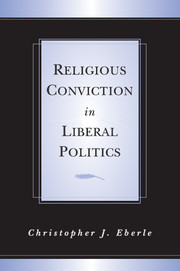Book contents
9 - A Theistic Case for Restraint
Published online by Cambridge University Press: 18 December 2009
Summary
INTRODUCTION
The argument I articulated in the prior chapter is a consistency argument, one of the central components of which is the following claim: any epistemic conception of public justification that is sufficiently powerful to mandate restraint with respect to mystical perception is, when applied consistently, also sufficiently powerful to mandate restraint with respect to all but the most platitudinous moral convictions. Although I intend that central claim to apply to religious commitments generally (notwithstanding my focus on mystical perceptions), certain kinds of religious commitment are more directly relevant to our topic than are others. In particular, any religious grounds that serve as a basis for moral claims, such as Bill McCartney's conviction that the Bible portrays homosexual relations as a moral abomination, play so prominent a role in political advocacy and decision making that they merit special attention.
In order to sharpen the focus on religious grounds that serve as a basis for moral claims, I briefly reformulate my consistency argument against epistemic conceptions of public justification so that it applies directly to religiously grounded moral claims. There is no compelling reason to believe that secularly grounded moral claims necessarily or generally enjoy an epistemic status superior to religiously grounded moral claims. The most plausible analysis of their epistemic virtues and vices is that religiously and secularly grounded moral claims enjoy a roughly comparable selection of epistemic desiderata.
- Type
- Chapter
- Information
- Religious Conviction in Liberal Politics , pp. 294 - 330Publisher: Cambridge University PressPrint publication year: 2002



